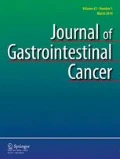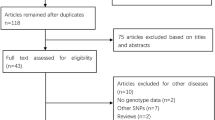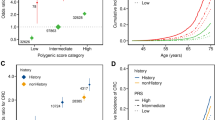Abstract
Background
The role of genetic factors in colorectal cancer pathogenesis is widely accepted. Polymorphisms are actually thought to play a role in the unexplained colorectal cancer (CRC) susceptibility. There is conflicting data regarding the role of the transforming growth factor beta receptor 1 polymorphism 6A (TGFBR1*6A) in the increased incidence of CRC.
Purpose
Our aim is to test the association between this polymorphism and sporadic/familial CRC in the Lebanese population paying attention to lead time bias in the control group. This is a case-control study conducted in two Lebanese hospital centers.
Materials and Methods
Cases were diagnosed with CRC during the period of 1 year prior to the study. Controls were healthy subjects aged >50 years with a history of normal colonoscopy during the period of 5 years prior to the beginning of the study. A total of 96 cases (57 sporadic/39 familial) and 97 controls were genotyped. The odds ratios for 6A carrier status was statistically significant for sporadic CRC, odds ratio (OR) = 2.314 (95 % confidence interval (CI) 1.030–5.195) but not for familial CRC.
Results
No association was found between 6A carrier status and mean age at diagnosis of CRC. This is the first article in the literature to evaluate the association between 6A polymorphism and total, sporadic, and familial CRC in a single study with reduction of bias in the control group. Results are in conjunction with other studies and meta-analysis.

Similar content being viewed by others
References
Siegel R, Desantis C, Jemal A. Cancer statistics, 2014. CA Cancer J Clin. 2014;64:104–17.
Parkin DM, Bray F, Ferlay J, Pisani P. Global cancer statistics, 2002. CA Cancer J Clin. 2005;55:74–108.
Jones S, Chen WD, Parmigiani D, Diehl F, Beerenwinkel N, Antal T, et al. Comparative lesion sequencing provides insights into tumor evolution. Proc Natl Acad Sci U S A. 2008;105:4283–8.
Edge B, Byrd R, Compton C, Fritz G, Greene L, Trotti A. AJCC Cancer Staging Manual 7th ed. New York: Springer; 2010.
Half E, Bercovich D, Rozen P. Familial adenomatous polyposis. Orphanet J Rare Dis. 2009;4:22.
Macrae F, du Sart D, Nasioulas S. Familial adenomatous polyposis. Best Pract Res Clin Gastroenterol. 2009;23:197–207.
Xu Y, Pasche B. TGF-β signaling alterations and susceptibility to colorectal cancer. Hum Mol Genet. 2007;16:14–20.
Valle L. Debate about TGFBR1 and the susceptibility to colorectal cancer. World J Gastrointest Oncol. 2012;4:1–8.
Pasche B, Luo Y, Rao PH, Nimer SD, Dmitrovsky E, Caron P, et al. Type I transforming growth factor β receptor maps to 9q22 and exhibits a polymorphism and a rare variant within a polyalanine tract. Cancer Res. 1998;58:2727–32.
Carvajal-Carmona LG, Churchman M, Bonilla C, Walther A, Lefèvre JH, Kerr D, et al. Comprehensive assessment of variation at the transforming growth factor β type 1 receptor locus and colorectal cancer predisposition. Proc Natl Acad Sci U S A. 2010;107:7858–62.
Castillejo A, Mata-Balaguer T, Montenegro P, Ochoa E, Lázaro R, Martínez-Cantó A, et al. The TGFBR1*6A allele is not associated with susceptibility to colorectal cancer in a Spanish population: a case-control study. BMC Cancer. 2009;9:193.
Forsti A, Li X, Wagner K, Tavelin B, Enquist K, Palmqvist R, et al. Polymorphisms in the transforming growth factor β 1 pathway in relation to colorectal cancer progression. Genes Chromosomes Cancer. 2010;49:270–81.
Pasche B, Kaklamani V, Hou N, Young T, Rademaker A, Peterlongo P, et al. TGFBR1*6A and cancer: a meta-analysis of 12 case-control studies. J Clin Oncol. 2004;22:756–8.
Pasche B, Kolachana P, Nafa K, Satagopan J, Chen YG, Lo RS, et al. TβR-I(6A) is a candidate tumor susceptibility allele. Cancer Res. 1999;59:5678–82.
Samowitz WS, Curtin K, Leppert MF, Slattery ML. Uncommon TGFBRI allele is not associated with increased susceptibility to colon cancer. Genes Chromosomes Cancer. 2001;32:381–3.
Skoglund Lundin J, Vandrovcova J, Song B, Zhou X, Zelada-Hedman M, Werelius B, et al. TGFBR1 variants TGFBR1(*)6A and Int7G24A are not associated with an increased familial colorectal cancer risk. Br J Cancer. 2009;100:1674–9.
Skoglund J, Song B, Dalén J, Dedorson S, Edler D, Hjern F, et al. Lack of an association between the TGFBR1*6A variant and colorectal cancer risk. Clin Cancer Res. 2007;13:3748–52.
Stefanovska AM, Efremov GD, Dimovski AJ, Jasar D, Zografski G, Josifovski T, et al. TbetaR-I(6A) polymorphism is not a tumor susceptibility allele in Macedonian colorectal cancer patients. Correspondence re: B. Pasche et al. (1998) Type I TbetaR-I(6A) Is a Candidate Tumor Susceptibility Allele. Cancer Res 58:2727-32. Cancer Res. 2001;61:8351–2.
Kaklamani VG, Hou N, Bian Y, Reich J, Offit K, Michel LS, et al. TGFBR1*6A and cancer risk: a meta-analysis of seven case-control studies. J Clin Oncol. 2003;21:3236–43.
Liao RY, Mao C, Qiu LX, Ding H, Chen Q, Pan HF. TGFBR1*6A/9A polymorphism and cancer risk: a meta-analysis of 13,662 cases and 14,147 controls. Mol Biol Rep. 2010;37:3227–32.
Zhang X, Wu L, Sheng Y, Zhou W, Huang Z, Qu J, et al. The association of polymorphisms on TGFBR1 and colorectal cancer risk: a meta-analysis. Mol Biol Rep. 2012;39:2567–74.
Skibber J, Minsky B, Hoff P. Cancer of the colon and rectum. In: De Vita VT, Hellmann Jr S, Rosenberg SA, editors. Cancer: principles and practice of oncology. 6th ed. Philadelphia: Lippincott Williams & Wilkins pp; 2001. p. 1216–71.
Calvert PM, Frucht H. The genetics of colorectal cancer. Ann Intern Med. 2002;1:603–12.
Fiocchi C. TGF-β/Smad signaling defects in inflammatory bowel disease: mechanisms and possible novel therapies for chronic inflammation. J Clin Invest. 2001;108:523–6.
Gordon K, Blobe G. Role of transforming growth factor-β superfamily signaling pathways in human disease. Biochim Biophys Acta. 2008;1782:197–228.
Bian Y, Knobloch TJ, Sadim M, Kaklamani V, Raji A, Yang GY, et al. Somatic acquisition of TGFBR1*6A by epithelial and stromal cells during head and neck and colon cancer development. Hum Mol Genet. 2007;15:3128–35.
Chen T, de Vries EG, Hollema H, Yegen HA, Vellucci VF, Strickler HD, et al. Structural alterations of transforming growth factor-β receptor genes in human cervical carcinoma. Int J Cancer. 1999;2:43–51.
Pasche B, Knobloch TJ, Bian Y, Liu J, Phukan S, Rosman D, et al. Somatic acquisition and signaling of TGFBR1*6A in cancer. JAMA. 2005;294:1634–46.
Rosman DS, Phukan S, Huang CC, Pasche B. TGFBR1*6A enhances the migration and invasion of MCF-7 breast cancer cells through RhoA activation. Cancer Res. 2008;68:1319–28.
Zhang HT, Zhao J, Zheng SY, Chen XF. Is TGFBR1*6A really associated with increased risk of cancer? J Clin Oncol. 2005;23:7743–4.
Acknowledgments
This study was funded by the Saint-Joseph University research center.
Conflict of Interest
The authors declare that they have no conflict of interest.
Author information
Authors and Affiliations
Corresponding author
Rights and permissions
About this article
Cite this article
Ibrahim, T., Yazbeck, C., Maalouly, G. et al. TGFBR1*6A Polymorphism in Sporadic and Familial Colorectal Carcinoma: a Case-control Study and Systematic Literature Review. J Gastrointest Canc 45, 441–447 (2014). https://doi.org/10.1007/s12029-014-9625-8
Published:
Issue Date:
DOI: https://doi.org/10.1007/s12029-014-9625-8




